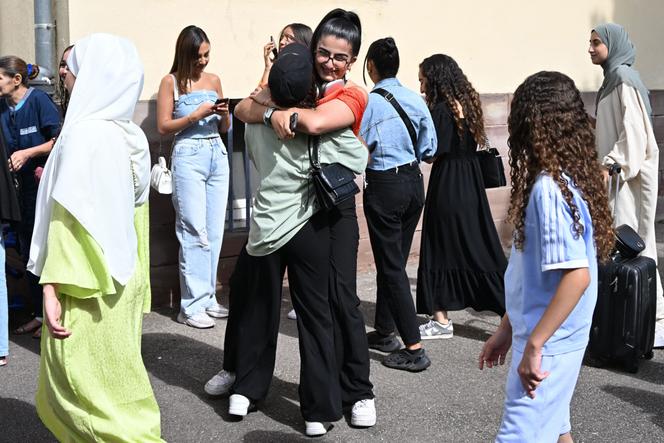


Elias d'Imzalène met with us not far from his home, in a rather stuffy Versailles tearoom. The customers included well-off young patrons and a number of well-dressed old ladies. There was not an abaya in sight. With his long, untrimmed beard, d'Imzalène stood out. But, as a true Versaillais, he was wearing a blazer with gold buttons and had an elegant leather satchel. His sophisticated chignon and rimless glasses completed a look that was hard to categorize – like his ideas.
Since the announcement of the ban on wearing the abaya in French schools, d'Imzalène, founder of the now dormant site Islam & Info, has been one of the most active and virulent voices on X (formerly Twitter) to mobilize people against a ban he considers Islamophobic. The 40-something, who describes himself as a "community influencer and political Muslim," prefers the label "Islamian" to "Islamist."
As far as the abaya is concerned, he's not for it per se, but he's vehemently against banning it. Not so much in the name of his religious values but because of each woman's right to control her own body. "In Islam, there is no clergy; it's up to each woman to decide what to wear, including the veil," he noted. "The abaya is a reflection of those who wear it and also the result of the influence of TikTok, fashion, the desire to be noticed..." His criticism of the abaya ban is that it "defines secularism, and ultimately Frenchness, as the antithesis of Islam, as if an enemy was needed to exist."
Since the Collectif Contre l'Islamophobie en France (Collective Against Islamophobia in France) was dissolved by decree in the fall of 2020, d'Imzalène has been one of the community's most vocal voices on this issue, but he is far from alone. Political scientist Gilles Kepel calls them "entrepreneurs of anger."
For d'Imzalène, the ban on the abaya in schools will not pass like the ban on the headscarf in 2004: "The country itself has changed, it's mixed. We are this country, too. We saw it with the riots that followed the death of Nahel M. [a 17-year-old killed by a policeman during a traffic stop on June 27]. There is a segment of Muslim youth who no longer want to remain silent and bow their heads. This generation isn't asking for its rights, it's exercising them."
In France, it's hard to find any religious authority or community leader explicitly advocating the wearing of the abaya in schools. In the Muslim sphere, people are instead mobilizing against its ban, following the example of Feiza Ben Mohamed, French correspondent for the official Turkish agency Anadolu and a polemicist, who, on Sunday, September 3, posted on her X account: "Happy back-to-school to all our little sisters who will be returning to class tomorrow, in the outfit of their choice. Be proud of who you are and don't let anyone make you think you're sub-citizens."
You have 47.46% of this article left to read. The rest is for subscribers only.
